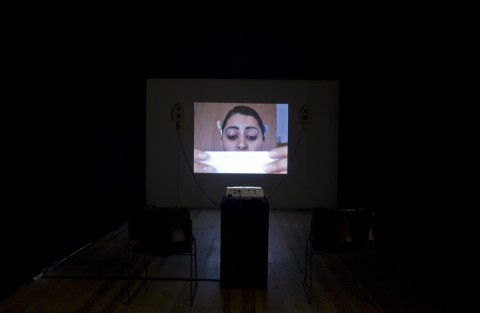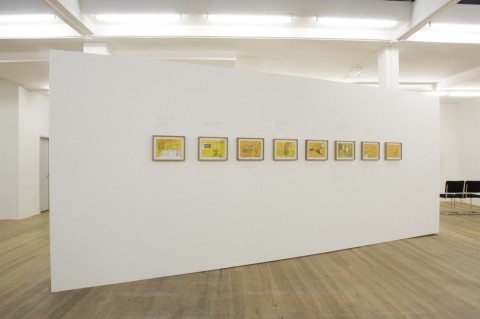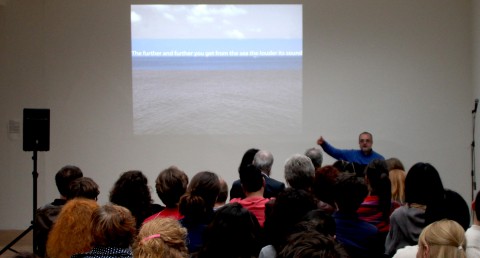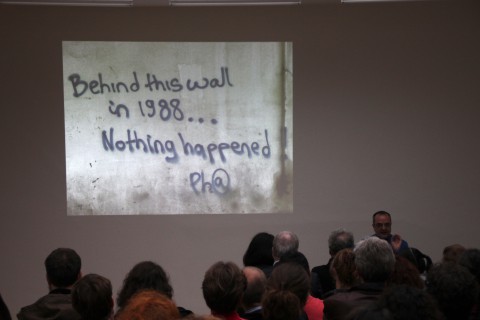On June 25th, architect, writer and artist Tony Chakar (Beirut, 1968) gave a lecture about the influence of the war on the everyday life in Lebanon. The complex history of the country, between 1975 and 1990 there was a civil war in Lebanon, and since 2006 there were several conflicts with Israel, deeply influenced the public space and the manner of dealing with language and culture.
Tag Archives: Bassam Ramlawi
Overview of the exhibition ‘Mounira Al Solh & Bassam Ramlawi’.
With work by Mounira Al Solh, Bassam Ramlawi and René Daniels.

Mounira Al Solh, Double Burger and Two Metamorphoses: a proposal for a Dutch Cat, a Dutch Dog, a Dutch Goat, and finally a Dutch Camel, 2011.

Bassam Ramlawi, From Waiting Blue to Lingering Yellow (or vice versa), 2010.
Elizabeth Suzanne Kassab is the author of the fourth Project 1975 essay
‘The Arab quest for empowerment. A thought of one’s own, a government of one’s own, an art of one’s own.’ Her essay reflects on the role of the intellectual in the Arab world in the decades after decolonization in the context of the ‘Arab Spring’.
While the Arabic regimes were criticised by a marginal group of intellectuals in the seventies, Kassab for instance refers to the Syrian film director Omar Amiralay, they are currenly joined by large masses of ordinary men and women. They reformulate the grievances and claims that were formulated before by the critical thinkers. However, these current demonstrants are not motivated by the writings of these thinkers but instead by the suffering in their own lives and the overwhelmed exasperation. With this shift in the performance and expression of criticism how should we define the role of intellectuals and artists? Download Newsletter 122 here to read Elizabeth Kassab’s essay.
Kassab studied at American University of Beirut business administration and philosophy, and continued her graduate studies in philosophy at Fribourg University in Switzerland. Her overall interest has been in the philosophy of culture, both Western and non-Western, with a particular focus on post-colonial debates on cultural malaise, authenticity and critique. Her book Modern Arab Thought. Cultural Critique in Comparative Perspective was published in 2009 by Columbia University Press. She is currently a visiting research fellow at the Berlin Graduate School for Muslim Cultures and Societies and working on a new book on revolutions and Enlightenment in the Arab world.
Stedelijk Museum Bureau Amsterdam proudly presents the first large-scale solo exhibition by Mounira Al Solh in The Netherlands. Al Solh’s work can be described as an inner conflict with social environments which impose national, cultural and religious identity. In that sense it is a reflection on the social and religious tensions in the country of her birth, Lebanon, which has undergone several civil wars and still occupies a sensitive position in the present eruptions in the Middle East. But here in The Netherlands one’s origins and culture are becoming an increasingly important aspect in social intercourse too. Al Solh approaches this fact with a mixture of autobiographical elements and humour – because how else can one approach censorship, repression, schizophrenia and the discordant culture in which everyone has a role?
A considerable part of the exhibition is devoted to the work of the figure Bassam Ramlawi. Ramlawi is a juice seller in Beirut who has studied art in The Netherlands, and since done portraits of people from around his shop in Beirut. A documentary shows that he is familiar with the oeuvre of Cindy Sherman and with a famous portraitist of the inter-war period, the German artist Otto Dix, but above all he admires the work of the Dutch artist René Daniëls.
Click here for more information about ‘Mounira Al Solh & Bassam Ramlawi’.


